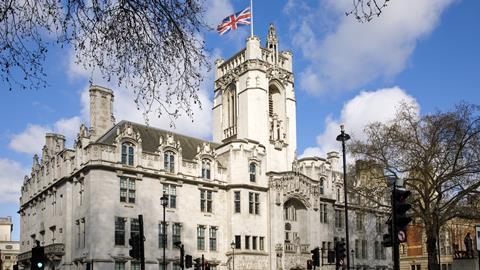The Supreme Court is poised to rule in a case which should clarify the law in relation to the treatment of non-matrimonial property.
The judgment, expected to be handed down at 9.45am on Wednesday 2 July, has been described by family lawyers as a ‘key Supreme Court decision in family law’ which could have ‘significant implications…particularly where large sums or trusts are involved’.
Standish v Standish was heard before Lord Reed, Lord Lloyd-Jones, Lord Burrows, Lord Stephens and Lady Simler earlier this year. The judgment will deal with the issue of when non-matrimonial assets become matrimonial property in the context of financial remedy proceedings as well as how the sharing principle should be applied to those assets.
In 2017 Clive Thomas Standish, a retired investment banker, transferred to his then-wife Anna Catherine Standish investments of more than £77m as part of a tax planning scheme. Those assets were originally his non-matrimonial property. The marriage ended in 2020. A judge found those assets were matrimonial property and divided them 60/40 in the husband’s favour. The wife was awarded £45m and ordered to transfer £87m to her former husband.
Anna Standish appealed the financial remedy order; her former husband cross appealed. The Court of Appeal found the transfer of the assets to the wife did not change their characterisation and transform them into matrimonial property. Dismissing the wife’s appeal and allowing the husband’s, the CoA said at least 75% of the assets were non-marital and awarded the wife £25m and the husband £107m.
Anna Standish appealed to the Supreme Court.
Read more
Specialist family practitioners agreed on the significance of the case. Julian Ribet, partner at Ribet Myles Family Law, said: ‘This ruling should provide some much-needed clarification of the law in relation to the treatment of pre-marital wealth and inherited assets on divorce. Hopefully it will help bring to an end lengthy and costly arguments in relation to the mixing and mingling of assets by parties during their marriage.
‘If the Supreme Court decides that assets transferred between spouses — even for tax planning — automatically become matrimonial, this would be a game-changer for wealthy individuals trying to protect assets in the event of a divorce. If, however, the court holds that the source of the asset matters more than whose name it is now in, it will cement a more conservative approach — protecting inherited or gifted assets unless they’re clearly shared.’
Miranda Fisher, family partner at Charles Russell Speechlys, said: ‘This case will be a key Supreme Court decision in family law. We have seen, in line with societal change, the growing importance and regularity of nuptial agreements and more recent family court decisions, that pre marital or non matrimonial wealth will be of the utmost importance in a big money case where the court is looking at sharing arguments.’
Nick Gova, partner and head of family at London firm Spector Constant & Williams, said: ‘The Supreme Court’s decision could clarify whether a gift made within marriage, even for the benefit of children, should be treated as a marital contribution or as a separate arrangement. The outcome may have significant implications for couples who structure their finances in this way, particularly where large sums or trusts are involved.’
This article is now closed for comment.




























2 Readers' comments